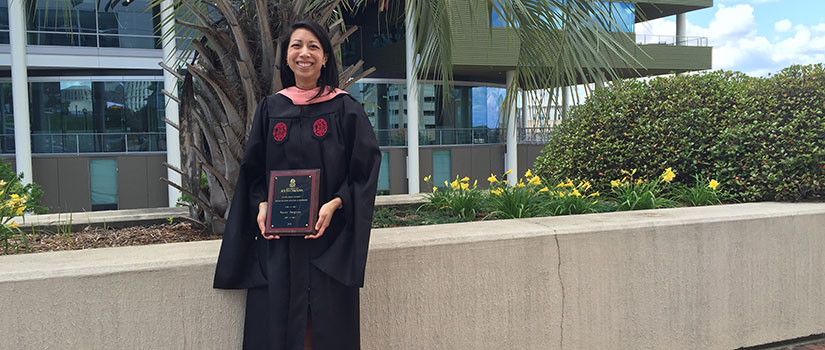August 24, 2016 | Erin Bluvas, bluvase@sc.edu
Stacey Sangtian did her homework before choosing her career path in communication sciences and disorders (COMD). After graduating from the College of Charleston with a bachelor's degree in biology, the Myrtle Beach, S.C.-native spent a year doing service work in New Orleans and then two years conducting nanotoxicology research at the National Institute of Environmental Health Sciences after receiving a National Institutes of Health (NIH) Postbaccalaureate Intramural Research Training Award.
It was during her role as a preschool teacher’s assistant working with nuns through Dominican Volunteers USA in New Orleans that Sangtian’s path first began to veer toward COMD. She remembers a student who knocked over another child’s block tower and his limited speech intelligibility made it difficult for Sangtian to understand whether the child had done the action on purpose or by accident.
“After piecing it together that it was an accident, I thanked him for trying to tell me the truth and he went back to playing—no hard feelings, no grudges, just a smile of satisfaction knowing that he was understood,” she says. “That moment stuck with me.” Something else that stuck with Sangtian from that year of service work was that she should view her career, whatever it may turn out to be, as her ministry.
I’m grateful for the support of the department. It’s easier to succeed when you are surrounded by positive people who want to see you be successful!
-Stacey Sangtian, Master of Speech Pathology Graduate
Her path took another turn toward COMD again through her role with NIH, where she re-explored her research interests. “During this time, I realized that I had a preference for bedside versus bench-side research,” Sangtian explains. “I then met with a career counselor at my alma mater, we talked about my interests and experiences, and she suggested I look into speech-language pathology. I felt it was a good fit.”
Sangtian chose the Arnold School at Carolina due to the reputable COMD program, which has a good team of active researchers. In addition, due to the department’s affiliation with the USC Speech and Hearing Research Center and connections with clinics and hospitals throughout the Southeast, she realized that their students experience a variety of clinical experiences that are not readily available in other programs.
The 2015 SPARC Award winner’s decision did not disappoint. She spent much of her spare time as a researcher in Assistant Professor Roozbeh Behroozmand’s Speech Neuroscience Lab, helping her mentor investigate the neural mechanisms of speech motor control to help lead to the development of novel methods for diagnosis and treatment of speech motor disorders in patients with neurological deficits.
“Dr. Behroozmand has always been very supportive and encouraging of my research and academic goals,” Sangtian says. “I was able to be a productive researcher because of the opportunities he made available to me.”
When you enter any clinical program, be open to a variety of experiences, take advantage of resources and extra learning opportunities available to you as a student, ask questions, and advocate for yourself.
-Stacey Sangtian, Master of Speech Pathology Graduate
This productivity includes one published paper with two more in preparation, multiple presentations, and a successful thesis defense on neural and behavioral correlates of planning during motor control. She was also invited to join the American Speech-Language-Hearing Association’s Minority Student Leadership Program.
In addition to Behroozmand, Sangtian credits her other thesis committee members, Allen Montgomery and Dirk den Ouden, as well as her clinical supervisors for helping her excel during her program. “I’m grateful for the support of the department,” she says. “It’s easier to succeed when you are surrounded by positive people who want to see you be successful!”
After her August graduation, Sangtian will begin a new role as a speech-language pathologist at a rehabilitation hospital in Columbia. After a few years of clinical practice, she will consider returning to school to pursue a Ph.D.
For those who are still figuring it all out, she has a bit of advice. “When you enter any clinical program, be open to a variety of experiences, take advantage of resources and extra learning opportunities available to you as a student, ask questions, and advocate for yourself,” Sangtian says. “Also, it’s okay if you don’t know exactly which clinical populations you want to work with as soon as you start! Your interest areas may change after working directly with the patients instead of reading about their diagnoses and treatment options in a textbook.”
